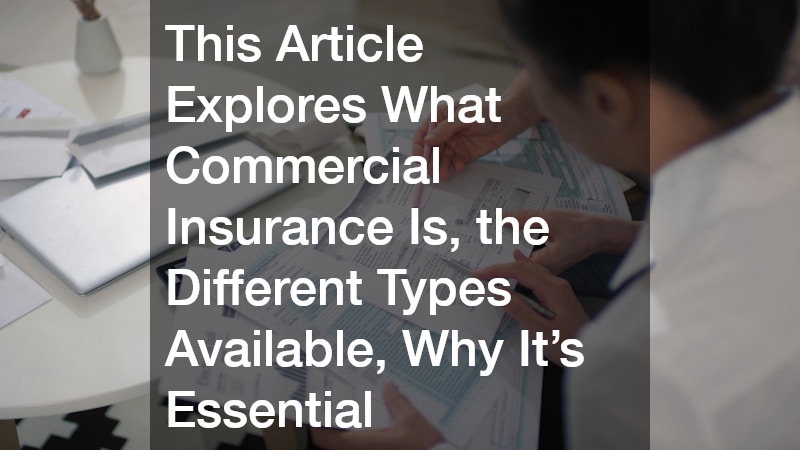This article explores what commercial insurance is, the different types available, why it’s essential, and how to determine which coverage your business needs most.
What Are the Types of Commercial Insurance?
Commercial insurance isn’t a single policy—it’s a combination of coverage types designed to protect various aspects of your business. Depending on your operations, size, and industry, you may need one or several types of policies to ensure comprehensive protection.
1. General Liability Insurance
General liability insurance forms the cornerstone of most business insurance plans. It protects your company against claims of bodily injury, property damage, or personal injury caused by your business operations, products, or employees. For example, if a customer slips and falls in your store or if one of your products damages a client’s property, general liability insurance covers legal fees, medical costs, and potential settlements. Without this coverage, even a single lawsuit could result in devastating financial losses for your business.
2. Property Insurance
Your business’s physical assets are often among its most valuable resources. Property insurance protects those assets—including buildings, equipment, furniture, inventory, and signage—against damage or loss caused by events such as fire, theft, vandalism, or natural disasters. Whether you own or lease your space, this type of insurance helps ensure your business can recover quickly from unexpected damage. Many policies also include business interruption coverage, which compensates for lost income if operations are temporarily halted due to a covered event.
3. Workers’ Compensation Insurance
Employees are the backbone of any successful business, and their safety should always be a top priority. Workers’ compensation insurance provides essential protection for both employers and employees in the event of a workplace injury or illness. It covers medical expenses, rehabilitation costs, and a portion of lost wages during recovery. In most states, workers’ compensation is legally required for businesses with employees, making it a vital component of a compliant and responsible operation. It also protects employers from costly lawsuits related to workplace injuries.
Why Do Businesses Need Commercial Insurance?
Some business owners, particularly those running small or home-based companies, may question whether commercial insurance is necessary. The truth is that no business is immune to risk, and even minor incidents can lead to significant financial strain. Here’s why commercial insurance is indispensable.
1. Legal Requirements
Many jurisdictions require businesses to carry specific types of insurance. For instance, workers’ compensation is mandated in nearly every state, while commercial auto insurance is required for companies that use vehicles for business purposes. Failing to comply with these regulations can result in hefty fines, legal penalties, or even the suspension of business operations. Ensuring your company meets all insurance requirements not only keeps you compliant but also demonstrates your commitment to employee and public safety.
2. Risk Management
Risk management is at the heart of sound business strategy. Even with the best safety protocols and precautions, accidents and unforeseen events are inevitable. Commercial insurance provides a financial cushion that allows your business to absorb these shocks without jeopardizing its long-term viability. Whether it’s a lawsuit from a customer, a fire that damages your office, or a cyberattack that disrupts operations, insurance helps cover the costs so your business can recover and continue operating smoothly.
3. Business Continuity
Unexpected disruptions can cripple an unprepared business. Commercial insurance ensures that when disaster strikes, your company can bounce back quickly. For example, property insurance with business interruption coverage can help replace lost income while you rebuild after a flood or fire. Similarly, liability insurance can prevent a lawsuit from draining your financial resources. Having the right insurance in place ensures your business can weather challenges and maintain stability, even in turbulent times.
How Can a Business Determine Its Insurance Needs?
Determining which commercial insurance policies your business needs requires careful evaluation. Every business is unique, and the right coverage depends on factors such as industry, location, size, and risk exposure. The following steps can help guide your decision.
1. Assessing Business Risks
Start by identifying the specific risks your business faces. For example, a restaurant must account for potential kitchen fires and food-related illnesses, while a construction company faces risks related to on-site accidents and equipment damage. List potential threats—both internal and external—and prioritize them based on likelihood and potential impact. This process provides a clearer picture of which insurance types are essential for your operations.
2. Consultation with Insurance Professionals
Insurance policies can be complex, with varying coverage limits, exclusions, and terms that may be difficult to interpret without professional help. Working with a licensed insurance broker or advisor ensures you receive expert guidance tailored to your business’s unique circumstances. These professionals can help identify coverage gaps, recommend appropriate policy limits, and negotiate favorable terms on your behalf. Their insights can save you both money and stress in the long run.
3. Regular Insurance Reviews
As your business grows and evolves, so do your risks. That’s why it’s important to review your insurance policies regularly—at least once a year or whenever you make significant operational changes. Expanding into new markets, purchasing additional equipment, hiring more employees, or introducing new products may all require updated coverage. A periodic review ensures your insurance remains adequate and responsive to your current needs, preventing costly surprises when you need coverage the most.
In today’s unpredictable business environment, commercial insurance is not just an option—it’s a necessity. It serves as a shield against the financial and legal consequences of unexpected events, helping businesses maintain stability and thrive in the face of uncertainty. From general liability and property protection to workers’ compensation and beyond, these policies collectively form the foundation of a strong risk management strategy.
By understanding the types of coverage available, recognizing the importance of insurance in legal compliance and business continuity, and regularly reassessing your needs, you can ensure your business remains protected no matter what challenges arise. As your business grows, make insurance an ongoing priority—because safeguarding your operations today paves the way for sustainable success tomorrow.


